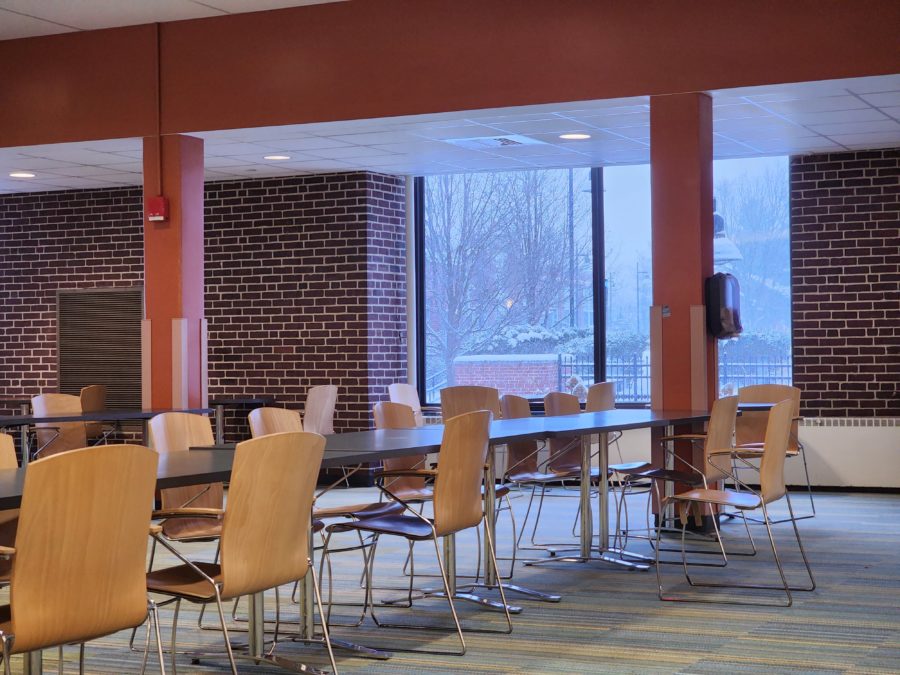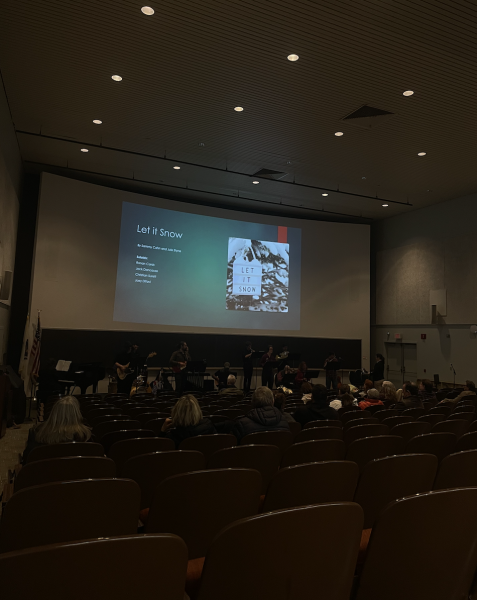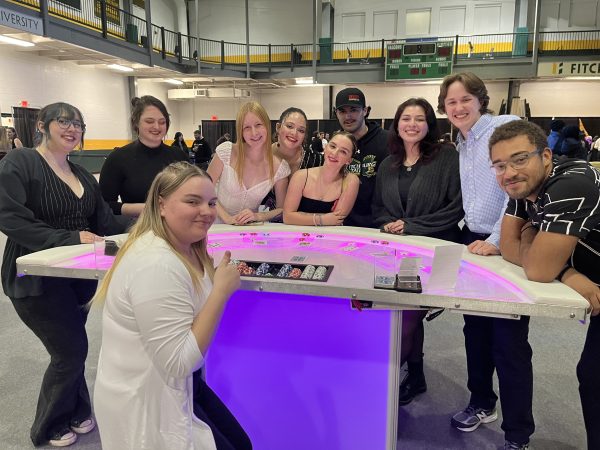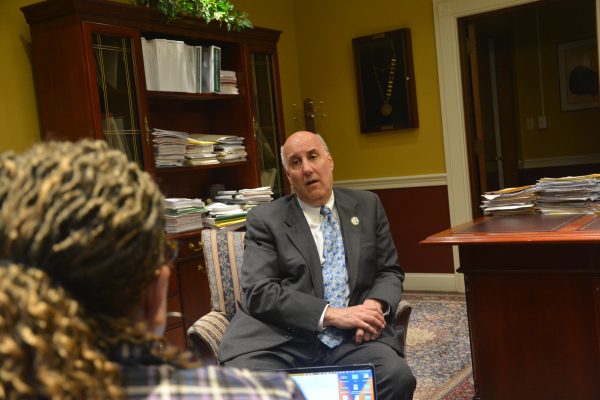Holmes Dining Commons: Director of Dining Services Jeff McVoy Responds to Student Questions and Concerns
Inside of Holmes Dining Commons during a cozy little snowstorm
Holmes Dining Commons, the only dining hall on campus for Fitchburg State University students, has been a hot topic of student conversation. The Point reached out to Jeff McVoy, the Director of Dining Services, to get his response to student concerns. While McVoy said he did not have time for a sit-down interview, he was more than willing to answer my questions over email.
One student concern recently has been that all the plates, bowls, cups, and cutlery are currently disposable. In response to this, McVoy stated Holmes Dining Commons “experienced some mechanical issues with the dish machine starting in mid-January. To ensure the health of our community, we have temporarily switched to single-use silverware.”
This was supposed to be a temporary, short-term solution according to McVoy. However, he added that “[…] the continuation of supply chain and staffing shortages has caused our parts supplier, Hobart, to have a delay in delivery and installation to repair our machine.” He also stated that the estimated cost of the repair is around $7,000, and will be completed as soon as the parts become available.
There have also been concerns about the environmental impact of this switch. McVoy stated that the dining hall does not currently have any figures available as to how much additional waste there has been as a result of the switch to single-use silverware, or how it has affected Fitchburg State’s overall carbon footprint.
Despite this, he wanted to assure students that Chartwells is “[…] continuing to uphold our day to day sustainability efforts including our ‘Waste Not’ program and upcycling food waste to the local pig farm.”
The Point also interviewed some students from campus to get their honest opinions on the dining services here on campus. Some students expressed frustration with the quality of food at the dining hall.
Anthony Sofia, a resident student, said “the lettuce in the salad bar is usually rubbery, which makes me less likely to eat the healthier options available.”
Sofia relies on the dining hall for most meals, like a large portion of residential students.
“On occasion the lettuce will have gone bad too, with noticeable brown and black spots,” said Sofia.
Sofia also said they noticed there was a period of time where the dining hall was consistently out of both ice cream and milk.
“I have flat out gotten raw food from there a couple of times,” Says Cole Wilkinson, another resident here on campus. “There’s been multiple occasions where I’ve bitten into meat that was pink to where it was raw as opposed to rare. And even when the food looks fine, it’s like a 75% chance that I would end up with my stomach hurting afterwards.”
When asked about their experiences with the dining hall, resident student and former employee of Holmes Dining Commons Emjay Hanson said, “I personally have never had any expired or undercooked food.”
They also stated that, in regards to undercooked food, “Any food students receive that is overcooked, I would like to think was originally put in the serving tray perfectly cooked. But since the trays have a heating element to keep food warm, eventually it can become overcooked or dried out if it sits there for a while.”
When asked about student concerns about the quality of service offered at Holmes, McVoy stated that “We strive to offer the best quality products and identify, prior to serving, when a product does not meet our standards. Supply chain challenges have caused shortages of products over the past year and half which may have resulted in less quantities available of certain products.”
There is also what students have come to call the “vat of ketchup”. There was a period of time when the ketchup dispensers in the dining hall were missing—presumably broken.
“For a while, a bowl of ketchup would just be sitting there with a giant spoon,” said Wilkinson.
This bowl of ketchup was just left uncovered for the entire day. It was, admittedly, a little gross. The ketchup dispensers have since been replaced, and the vat is no more.
Some students have also expressed frustration as a result of some of the dining hall’s staff’s actions. Lauren Tillbury, a Resident Assistant in Mara Village 8, stated that she had a negative interaction with a staff member who judged her for taking a while to make her plate and being “picky” with her selection of food.
“For years I struggled with having the courage to eat in a cafeteria because of bad experiences with employees. When someone makes insensitive comments, it goes a very long way. I still struggle to this day eating in the dining hall because I constantly feel like I am doing something wrong just by being there,” said Tillbury.
Mackenzie Harris, an Orientation Leader and Peer Tutor on campus, also had a bad experience with an employee last semester.
“I went to the dining hall, and the person at the front was having difficulties swiping my OneCard. They had swiped it a few times and it wasn’t working, so they decided to swap over to my guest swipes and used a guest swipe on me without asking me first,” said Harris. “They didn’t address it much more than just saying ‘Okay, I did a guest swipe and it worked,’ and so I lost a guest swipe for the semester.”
Some former employees had some negative experiences during their employment at Holmes Dining Commons as well.
“When I was still working at the dining hall, I requested less hours because living as a full-time student with a part-time food service job was unmanageable for me in terms of stress level,” said Hanson. “Two days later, I got a mass email saying that due to the minimum wage increase, everyone’s hours were being cut.”
Hanson also wanted it to be clear that they “[…] see the dining hall employees and their bosses as people that are really trying their best to keep working and getting paid.”
The hours of operation at the dining hall is also a point of contention among students. On Monday-Thursday the dining hall is open from 7:15 a.m.- 10:30 a.m. for breakfast, then reopens from 11:15 a.m.- 7:30 p.m. for lunch and dinner. On Fridays, the dining hall closes one hour earlier at 6:30 p.m., and on Saturdays and Sundays it is only open from 11 a.m.- 1 p.m. for brunch, and 4 p.m.- 6:30 p.m. for dinner.
Students often say how these times are largely inconvenient for them, especially athletes who have practices that extend beyond the dining hall’s hours of operation.
For comparison, Worcester State University’s Sheehan Dining Hall, which is also serviced by Chartwells, is open from 7:30 a.m.- 7:30 p.m. Monday-Friday and 10:30 a.m.- 7:30 p.m. Saturday-Sunday.
Salem State University’s Marsh Dining Common is open from 7 a.m.- 2 a.m. Monday through Sunday.
It is important to note that these sister state schools’ dining plan’s start at around $2,000, which is about $200 higher than Fitchburg State’s Unlimited plan. These plans also include higher amounts of dining points, more guest swipes, access to markets, and even access to full kitchens with ingredients.
There seems to be a lack of communication between the student body and dining services as well. For example, at the time this piece was written, there has been no email sent out to the student body communicating as to why there is only single-use dinnerware.
Additionally, unionized workers at Sysco’s Syracuse warehouse—the food supplier for Holmes Dining Commons—went on strike for around three weeks last semester. During this time, the Dine on Campus app where students can preview the menu of options in the dining hall didn’t have accurate menus due to the inconsistency of food deliveries. There was also a noticeable decrease in food quality and quantity.
When the strike was active, McVoy said that the menus were based on what they could find.
“We never knew when our next delivery was coming,” he said.
This was never communicated to the entire student body, and was only disclosed after a student asked about it during SGA’s Falcon Talks event last semester.
Another thing Wilkinson pointed out is that it almost at times feels as though the dining hall is purposely misleading visitors to campus into thinking that the dining services here are better than they actually are.
“When people come for field trips or visit campus for things like Open Houses and Future Falcon Day, the food quality seems to go up, and only on that day. When it should be everyday since people should be excited to come here to eat the food.” noted Wilkinson.
McVoy wanted to let students know that this semester Chartwells has started a monthly Dining Focus Group to gain more student feedback on their menus and offerings students are looking for. These meetings are open to all students, and they are hosted once per month.
More information on these events is available on the Dine on Campus website as well as sent out via email to all student email accounts prior to the event, and encourages more students with questions or concerns to consider attending these meetings to have their voices heard.
Elliot Zopatti is a junior at Fitchburg State University, and this is his first semester as a staff writer for The Point. They are majoring in Communications...













